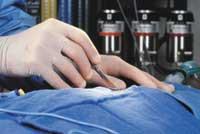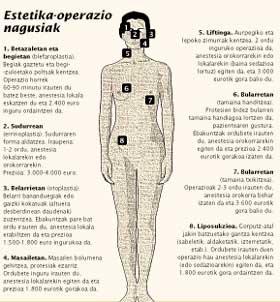Beware of aesthetic surgery
Unfortunately, the previous two are not the only example of medical neglect in cosmetic surgery interventions. It is true that the above mentioned (liposuction and breast augmentation) are surgical and, therefore, risk interventions, like any other operation. But in recent times, as if they were mushrooms, the clinics that have proliferated and the professionals who often work without the necessary qualifications, make the unfortunate events more and more numerous.
What is plastic surgery?

The medical specialty is very wide and it is not the one that, as we hear and read in the media, only takes care of repairing the nose or breasts and eliminating wrinkles of the face. Plastic surgery is the specialty that deals with the treatment of burns, congenital deformities, various lesions and tumors after traumatisms.
- After a burn, for example, plastic or aesthetic surgery may be necessary to complete the skin that has been filled with scars.
- Deformities in the ears are congenital alterations that are most often treated by plastic surgeons.
- Surgeons need a lot of skill and patience to solve the lips of hare and the crevices of the palate, and in some cases until maturity a long series of operations is required if you really want to solve.
- Some of the skin tumors are best treated if broad fragments of the skin are removed and their recovery is in the hands of surgeons specialists.
Other operations that we might consider aesthetic are those that are performed to improve the appearance of the body parts that are normal: for example, the extraction of the skin “surplus” in the eyebrows, face and neck; the reduction or elegance of the nasales salient; or the personal satisfaction of the breasts (in some cases the patient will want to increase and in others will urge the doctor to decrease). These operations have a great influence on the psychology of the patient, since a certain physiological or morphological characteristic may have the strength to isolate a person. Therefore, all these factors must be taken into account when assessing the risks of the operation and the postoperative period.
And we, the patients, what should we look at?
In the words of Dr. José Sainz Arrangi, president of the Spanish Association of Plastic, Reparative and Aesthetic Surgery (known as SECPRE), the main reason for the current situation is the existence of an important legal vacuum around the title of surgeon that performs cosmetic operations. “There is no degree of aesthetic surgery. The scope of aesthetic surgery should be, by law, plastic and repairing surgery. But what happens? In this title the word aesthetics does not appear, and that legal vacuum is addressed by those who say that aesthetic surgery can be practiced by anyone.”
And the figures are terrible. It is estimated that in Spain at the moment there are 6,000 doctors who practice cosmetic surgery interventions, even though only 600 specialists prepared for it.
- To avoid problems, the surgeon should have an adequate degree. And since we are not in possession of the title of aesthetic surgeon, aesthetic doctor or cosmetic surgeon, we should request and demand the title of plastic and reparative surgery to anyone who should perform any of these operations.
- Always request informed consent. In this document, in addition to reporting on the risks and complications of surgery, the doctor must determine its specialty.
- This operation, although it is the simplest and easiest of all, must also control the sanitary conditions of the place where it is to be performed: in addition to having a sterile operating room, it should have a defibrillator and an awakening room for the patient to recover under the control of the anesthesiologist.
- Verification of compliance with all legal authorizations.

Buletina
Bidali zure helbide elektronikoa eta jaso asteroko buletina zure sarrera-ontzian











